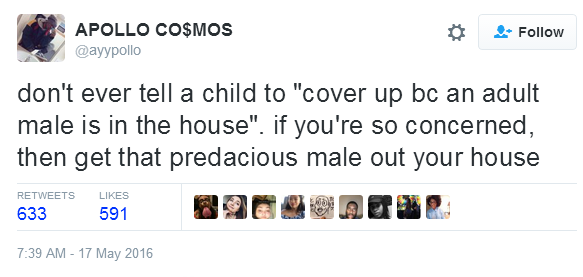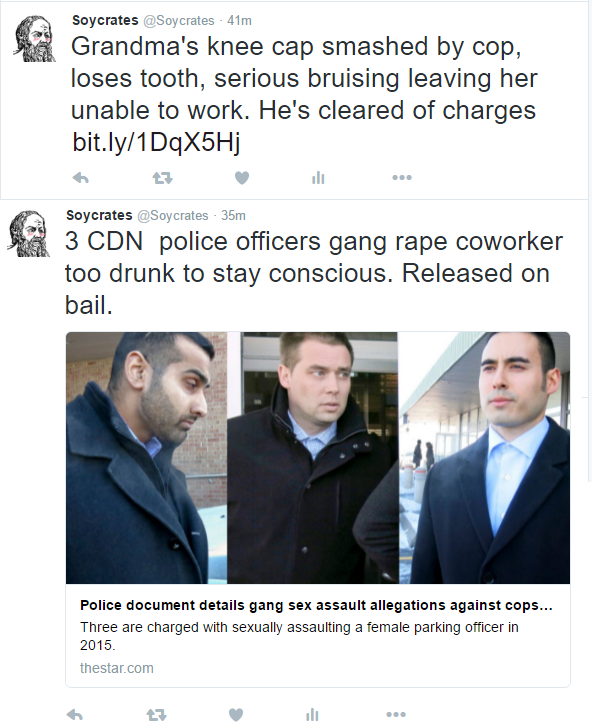
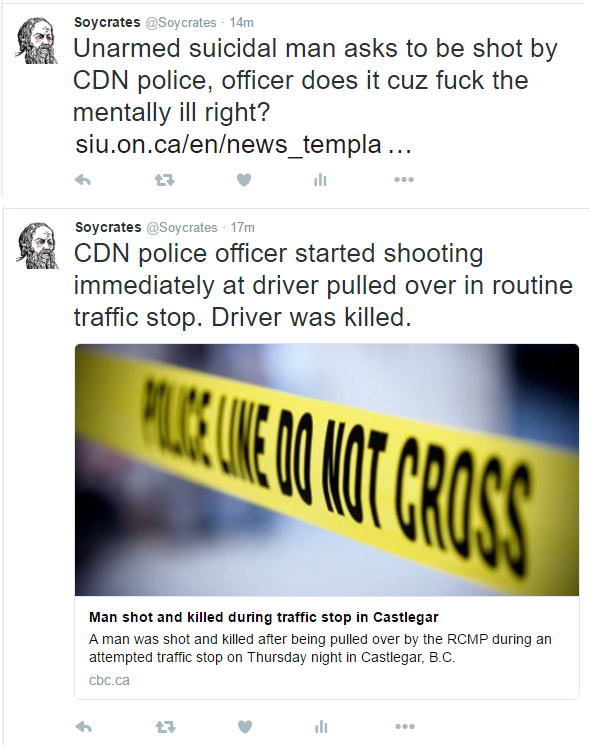
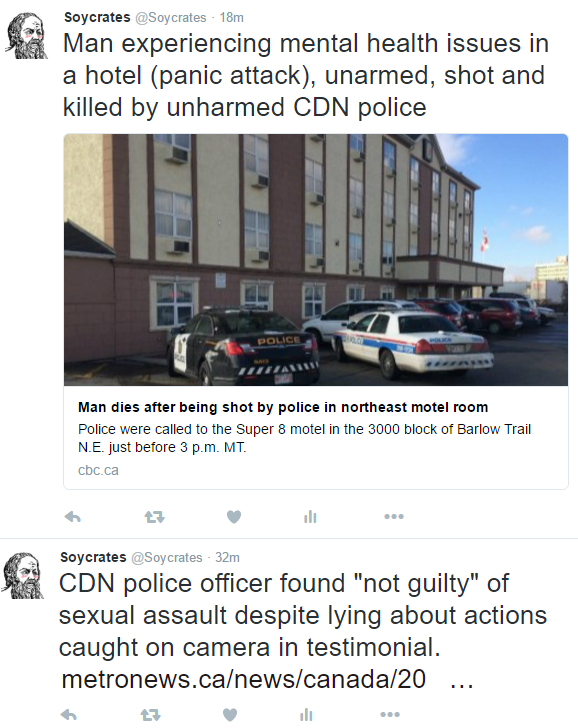
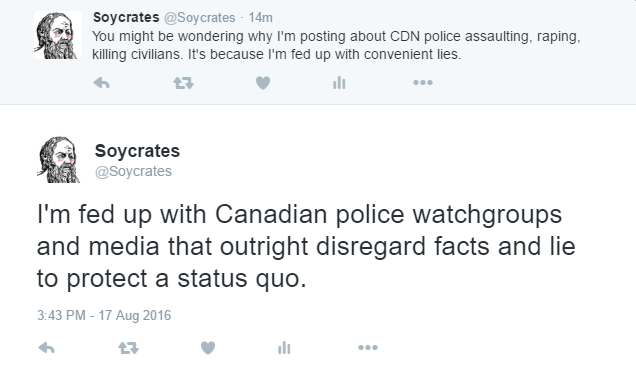
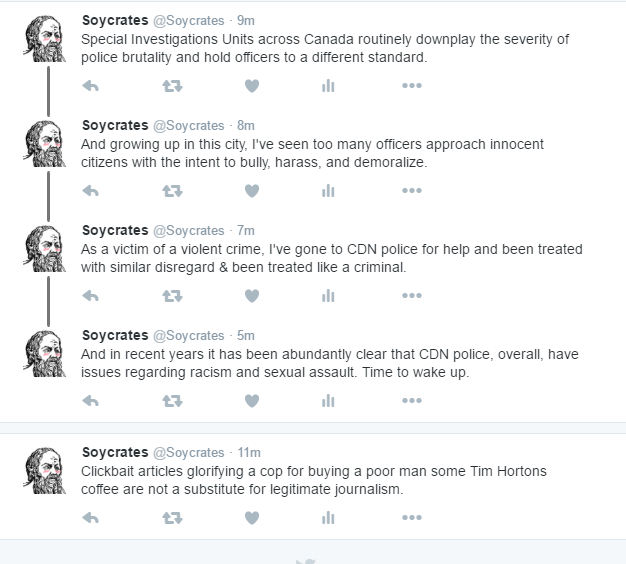
This might come as a surprise to some people, but Canada is not perfect. Some Canadians may want to say that not all cops are going to or even capable of harassing the public in the ways discussed above. “I know a good cop”, “my sister’s husband is a good cop”, “who do you think is going to help you if you’re a victim of a crime?”
What is important, however, is that nearly every Canadian law officer understands how our society works, and understands that they hold privilege of preferential treatment above the law if they are to ever commit a violent or demoralizing act against another human being.
Canadian cops are treated like they embody the stereotype of the honest, polite Canadian that the worlds sees us as. But in reality, they are humans – and even sometimes, monsters.
I would very much like links to these articles.
Sources in order:
Agency was investigating whether Sgt. Russell Watson used excessive force against Orillia woman
Police document details gang sex assault allegations against cops
SIU Concludes Investigation into Oakville Shooting Death
Castlegar RCMP say man shot and killed at traffic stop
Man dies after being shot by police in northeast motel room
Ontario police officer found not guilty of sexual assault after trial
If you’re concerned about this, here are resources, and some context:
Toronto Police Accountability Coalition (co-founded by former mayor John Sewell)
Office of the Independent Police Review Directorate (brought about in part by the LeSage Report, which was a response to criticism of police violence and accountability in Toronto, Ontario, and Canada)
Ontario Civilian Police Commission (as per their website, “…
an independent oversight agency tasked with ensuring that adequate and effective policing services are provided in a fair and accountable manner…”)
G20 Class Action lawsuit (when Toronto hosted the G20 Summit, police arrested protesters in what was the largest mass arrest in Canadian history)
ARCH Disability Law Centre’s submission to the Standing Committee on Justice Policy
on Bill 103, An Act to establish an Independent Police Review Director (this submission concerns both ARCH’s balliwick, accessibility concerns, and broader concerns about police accountability, as well as what ARCH sees as flaws in the Act)Ontario Police Complaints System Public Forum (from 2013, hosted by Scadding Court Community Centre’s website)
I live in Toronto, and did some very limited activism around police accountability 15 years ago, which is why my awareness of this is focused on organizations like these.
You may also be interested in a little historical context as well: the LeSage Report was released in spring of 2005, as condemnation of police violence against protesters at big demonstrations faded (in no small part due to anti-war activism having leached energy from anti-globalization protests in the West, and in turn fading due to the increasing momentum of the War on Terror in Iraq and Afghanistan) from public discourse. However, it was still fresh enough that the public could recall easily enough the tear gas wafting into the sky above Quebec City in 2001, the young man shot to death by Italian police in Genoa, or the APEC protest in Vancouver in 1997 (see Nardwuar’s famous question to Prime Minister Jean Chretien about that and the PM’s infuriating response). Activists made public their research into the strong links between the actions of the police in these situations, and the actions of police regularly assaulting and terrorizing people of colour, the poor, sex workers, and First Nations members. The McGuinty government, confident in their 2003 mandate from Ontarians ending the Common Sense Revolution, were determined to address this issue. I think, given that Michael Bryant was the Attorney General at the time, they were more than just a smidgen earnest in this legislative act. (Bryant, for all his faults, seems to be a lower case liberal as well as a Liberal)
But 2005 was also the “Summer of the Gun” (see also Idil Burale’s Part II, and Spacing’s conclusion to the series) culminating in the Boxing Day shoot-out. Street gang violence had made headlines, and the government moved quickly to dramatically increase their efforts to combat it: the Toronto Anti-Violence Intervention Strategy, or TAVIS; hiring more police officers in Toronto (and later in other cities across the province); creating a Guns & Gangs Operations Centre; and increasing the number of Crown Attorneys, Judges, and other Justice staff. The focus of these efforts was and is on street gangs, organized crime, and outlaw motorcycle gangs, but it’s clear that the TAVIS raids and arrests of black and brown people in the Greater Toronto Area takes the spotlight. TAVIS, and TPS (Toronto Police Services) in general, “carded” a lot of black and brown people. Black and brown people have complained about TPS violence long before BLMTO.
The Ontario government strode forth bravely to reduce the violence its armed agents create in the administration of justice, by acting on the LeSage report. However, the government undermined this by the increase of its policing of black and brown bodies in their anti-Guns & Gangs operations. I feel it’s critical to complement the reporting of individual police officers acting violently by providing a background of how the government goes about supporting, funding, and legislating police activities. It’s also important to note that this doesn’t happen in a vacuum, either; violent crime in racialized communities has an effect on policy, and concomitant police violence in those communities.
YO CHECK THE ADDITIONS ^^^


